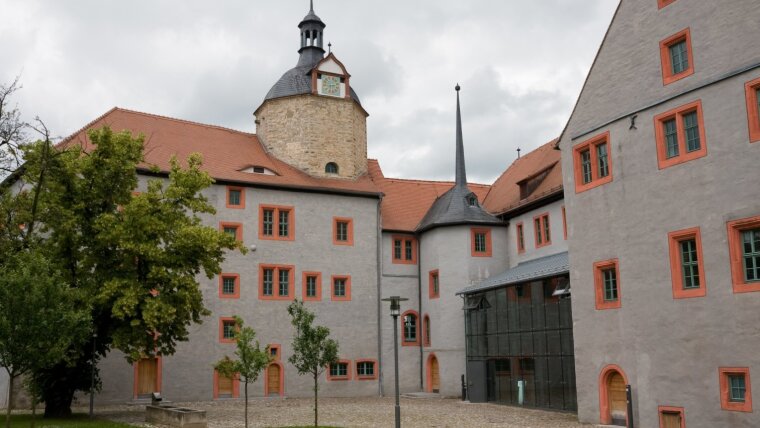
General Information
- Organizers:
Prof. Jean d'Aspremont (Sciences Po School of Law, Paris) / Prof. Dr. Thomas Kleinlein - Venue:
Altes Schloss Dornburg - Date: 8/9 June 2023
- Workshop language:
English
Historiographical debates about international law have been flourishing in the international legal literature over the last two decades. Following what international lawyers described as a ‘turn to history’ – and which is probably better understood as a turn to historiography –, it has become common for international lawyers to discourse and theorize about the specific forms and the meanings provided to the past and the ways in which such a past is created and organized by international lawyers. Such prolific historiographical debates have led to a wealth of new histories and counter-histories of international law. Being mostly produced in circles deemed (or self-labelled as) critical, this new body of literature has been promptly portrayed as an offspring of critical legal thought. Indeed, many international lawyers have considered that the historical turn constituted a natural continuation of the linguistic turn and the rise of critical thought witnessed a few decades earlier in international legal scholarship. And yet, the recent interest in the history of international law is no monopoly of (critical) international lawyers. Mention must be made of the growing interest for global histories among historians.
This workshop is premised on the idea that a continuity between critical thought and critical history is far from obvious and that it remains unclear whether all the new histories and counter histories produced after the ‘turn to history’ can be appropriately called critical. Arguably, their disruptive nature is compromised because most of them have remained articulated around the same European markers and figures. Questioning the kinship between critical thought and the turn to history in international law allows this workshop to take a hard look at the ‘critical’ character of the new histories and counter-histories of international law. The aim of this workshop is to shed a new light on the historicization of international law and its limits. To that end, participants are invited to reflect on the preconditions, modes and legacies of the ‘turn to historiography’.
Programme
| Thursday, 8 June 2023 | |
| 11:45–12:15 | Arrival and light lunch |
| 12:15–12:45 | Jean d’Aspremont/Thomas Kleinlein, Welcome and introduction to the theme of the workshop |
| 12:45–15:15 | Theme 1: Legacies of the Turn to History |
| 12:45–13:30 |
(1) Carl Landauer, Lather, Rinse, Repeat: The Historical Returns of International Law (2) Alexander Schmidt, The History of the History of Human Rights: German Professors and the Creation of Modern International Law (3) Tor Krever, Erasures and Recoveries in International Legal History |
| 13:30–14:00 | Discussion |
| 14:00–14:45 |
(4) Letizia Lo Giacco, History and the Promise of Truth: Rationalities at Play in the Construction of Cause-effect Relations (5) John R. Morss, Limits? What Limits? Historically Turned Scholarship in International Law as Costume Drama (6) Jakob Zollmann, Contextualism, Contingencies, and (No) Critique of Sources: On the Lure of Anachronism in International Legal Histories |
| 14:45–15:15 | Discussion |
| 15:15–15:45 | Coffee break |
| 15:45–17:05 | Theme 2: Contemporary Concepts and Practices of the Turn to History |
| 15:45–16:15 |
(7) Jens Meierhenrich, Three Ways of Thinking “Critically” About International Law (8) Michele Tedeschini, What do International Lawyers Desire? A Lacanian View on the Turn to History |
| 16:15–16:35 |
Discussion |
| 16:35–17:05 |
(9) Daniel R. Quiroga-Villamarin, ‘Architects of the Better World’: The Birth of the International Parliamentary Complex (1918–1998) (10) David Scott, Time and the Uses of International Legal History |
| 17:05–17:25 |
Discussion |
| Public Keynote Address Kleiner Rosensaal, Fürstengraben 27, 07743 Jena |
|
| 18:15 |
Liliana Obregón, Universidad de los Andes, Bogotá: "International Lawyers and the Uses of History: The Historiographical Turn in Perspective" |
| Friday, 9 June 2023 | |
| 09:45–10:15 | Theme 3: Modes of (Counter-)History-Writing in International Law |
| 09:45–10:15 |
(11) Ryan Mitchell, Narrative Logics and the Problem of Authorship in International Legal History (12) Felix Lange, The Narrative Turn and its Limits |
| 10:15–10:35 | Discussion |
| 10:35–11:05 | Coffee break |
| 11:05–11:35 |
(13) Alexandra Kemmerer, Biographical Illusions? Critical Legal Scholarship, the Historiography of International Law, and the Turn to Protagonists (14) Ignacio de la Rasilla, The Turn to Biography in the History of International Law |
| 11:35–11:55 | Discussion |
| 11:55–12:25 |
(15) Rene Fernando Urueña Hernandez, Digitizing the International Legal Archive (16) Rebecca Mignot-Mahdavi, Futurism: Neglected Histories of International Law |
| 12:25–12:45 | Discussion |
| 12:45–14:15 | Lunch |
| 14:15–15:00 | Concluding discussion and closing remarks by Jean d’Aspremont and Thomas Kleinlein |